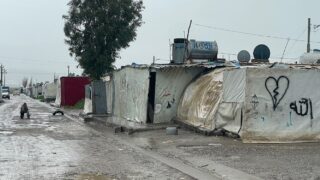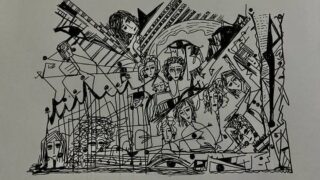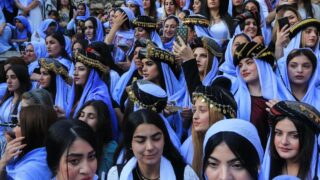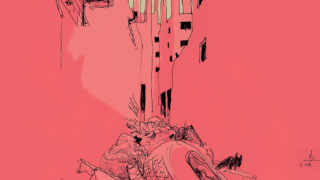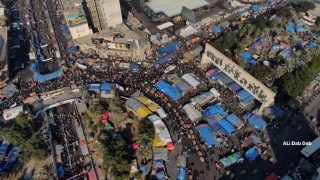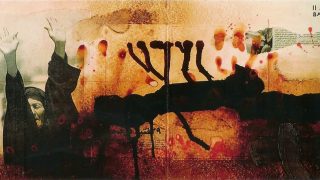How the concept of “national reconciliation” in Iraq was transformed into a bureaucratic machine of sectarian war. From Iraq’s Omr al-Jaffal, Iraq’s non-state-building project under Prime Minister al-Maliki:
The fall of Iraq’s largest province into the hands of armed groups has show very clearly the depth of the rifts in the country. Unreligious, and even atheist writers have abruptly rushed back into the sectarian trenches to wave the flag of religious hatred that was hibernating inside so many Iraqis.
People of moderate beliefs take refuge in silence in moments of acute crisis, worried that any word will somehow bear a sectarian tone. But politicians on the other hand jump at the chance to discredit their adversaries. Shiite politicians blame Sunni politicians, and the Sunnis blame the Shiites.
At the heart of Iraq’s crisis is the farce that is the billions spent by various Iraqi governments on the National Reconciliation Commission. A commission organized along tribal lines that was supposed to sow a new spirit of affection between Iraq’s religious sects.
The American invaders had deepened the fault lines between the Shi’ites and Sunnis, in order to sap the strength of the attacks against its troops by both sects; divide and rule, impose sectarianism and sow civil war. And the Iraqi government signally failed to mend those fractures.
Everyone knows that it was no simple matter to bring the Sunnis back into the political scene after the invasion; they had lost their former influence in government. Even wealthy Sunni families who had once been favored by the regime found themselves out in the cold.
The difficult project of the first reconciliation agreement, which saw the reentry of a number of Sunni notables into the country’s political life, helping to draft the 2005 constitution and later participating in the elections, was not permitted to last for long. The national government, itself a product of the quotas set in the reconciliation agreement, needed only a few years before it started chasing the Sunni political figures out, replacing them with [Shiite] extremists whose political practices were based on religious division and sectarianism.
So it was that a marriage of convenience between sectarian politicians started taking the first steps down the path of divorce soon after the Americans withdrew their troops from the country.
First there came the terrorism charges against Iraq’s vice president, Tariq al-Hashemi. Then came the arrest of a group of proteges of the former finance minister, Dr. Rafi al-Issawi, whose involvement in the Iraqi government had originally come as part of a deal with Washington; but the Americans had later accused him of giving medical treatment to gunmen attacking American troops in Fallujah when he was posted at the hospital in that city.
The attacks on these two important Sunni leaders were a declaration of war against the Sunnis; or at least that is how it was understood by – and explained to-the ordinary people of Iraq’s western regions who are mostly Sunnis.
Matters were made worse when the government decided to stop paying the salaries of the ‘Sahawat’ militias of al-Anbar province. These were brigades of Sunnis that had been created by the Americans in 2007 to fight al-Qaeda; a struggle that they had to a large degree won.
The Sahawat had demanded to be inducted into the Iraqi army, like the Shi’ite militias which were at the same time being absorbed into the regular army by the government in Baghdad. The government’s refusal to integrate the Sahawat into the army had left them vulnerable to torture and killing at the hands of the armed men of the Islamic State in Iraq and Syria (ISIS, or DAESH).
The pretext for their exclusion was that the Sahawat salaries were becoming a burden on the state’s budget. The budget item in the national reconciliation project for their salaries, of 12 million dollars a month, remained even after they stopped being paid.
Instead of embracing these men who had fought al-Qaeda and DAESH, the national reconciliation budget was now being spent on organizing futile conferences, in which depthless poems were recited, and even shallower speeches delivered.
A series of movies made by DAESH, called Saleel al Sawareem [The Clashing of the Swords] goes into detail about how the government literally abandoned those who had restored security to the province that once again became a hotbed for extremist organizations.
At the same time, the government of Nouri al-Maliki was openly sustaining the Shi’ite militias whose presence on the streets of Iraq grew ever more visible. Members of these militias were using official license plates on their vehicles, and most had IDs that allowed them to enter the fortified Green Zone. Militias were assembled and sent off to fight in Syria; one was led by the Iraqi transportation Minister, Hadi al-Amiri, who also runs the Badr Organization [once known as the Badr Brigades]and who is a close confidant of al-Maliki.
Disaster began to lurk in the dark voids left by the exclusion of Sunni forces. It was a familiar equation, and plenty of moderate Iraqi journalists and writers rang the alarm bells about the dangers of this policy; they sought to alert the government, but which government?
A government that had become the property of a handful of political parties who lived off the sectarianism they were planting deep in the social fabric of Iraq? “Give them more sectarianism, and they will give you more votes,” was the motto of numerous deputies in numerous campaigns for places in the third postwar Iraqi parliament last April. Among them was a woman deputy from the al-Maliki coalition who repeated more than once on television shows that “I want as many Sunni deaths as there are Shiite deaths.”
This deputy and her party had apparently not stopped to think about the simple mathematical equation of proportions: since the Shiites are the majority, bombings in mixed areas will always kill more Shiites than Sunnis. Nor was she interested in why Sunni areas had turned into nurseries for terrorist organization: a direct result of corruption among army leaders and the prime minister’s choice to give up his allies of yesteryear as easy prey for DAESH.
During the sectarian massacres that had begun in 2006, one of Maliki’s closest confidants, Amer al-Khuzai, had rushed to launch a ‘National Reconciliation Committee’ to help get the militias involved in the fighting off the esteets, and integrate their members in to ordinary life and institutions.
Millions of dollars were spent on disarming militias, both Sunni and Shiite, and putting a stop to the fighting.
In 2010, after the parliamentary elections of that year, a new ‘National Reconciliation Ministry’ was created with Khuzai at its head, as part of a cabinet that had now artificially swollen to 43 ministers, a symbol of political greed. After a shower of criticism over this expansion, a number of the new ministries were eliminated, among the Ministry of National Reconciliation. Khuzai was demoted to a seat as the Prime Minister’s special advisor on national reconciliation. Needless perhaps to say that Khuzai’s chancellery has its own budget-which is not public-to spend on “planting the spirit of love between Iraqis.”
As it turned out, corruption overshadowed love in the chancellery. Khuzai was accused of spending large amounts of money on various Sahawat groups which had only a virtual existence, even as he continued to spend money on militias that opposed the government, in hopes of bringing them into the state’s embrace.
The money the government was spending on the militias was just ink on paper, and while the documentation suggested that the militias were giving up their arms in exchange for subsidies, the facts on the ground were that the militias were actually escalating their operations, consolidating partnerships, and occupying entire cities.
As usual however, “The Hajji”, as Malikis friends like to call him, turned a blind eye when it came to accusations against one of his allies.
After Mosul fell into the hands of the very organizations the government was negotiating with via the reconciliation chancellery, al-Maliki had no clue who to blame: he was after all the head of the intelligence services, the Ministry of the Interior, and the commander in chief of military operations as well as being prime minister.
So in the beginning, he thought the solution would be to offer the heads of fifty-nine military officers to Iraqi justice, one of whom pointed out that he had been ordered to withdraw [in the face of the DAESH assault], and asked why he was beign prosecuted for that.
This would not be enough to convince Iraqi public opinion, so Maliki resorted to the one theory that Iraqis have been raised and nurtured to hear: that there was a conspiracy against us.
Since 2003, succeeding Iraqi governments have systematically established a non-state-building project. They have ensured that there is always enough chaos to cover their shameful deeds and disastrous mistakes.
This has had direct consequences in Iraqi society, since the government-any of them- has been made up of a collection of parties that are waging war on each other, and are incapable of making collective decisions. The average Iraqi was thus always ready to lay blame on the “other” parties instead of holding the government as a whole accountable.
That is how al-Maliki (representing the Shiite pole in the government) was able to prevent himself from being held accountable by his own supporters. Likewise Usama al-Nujayfi, speaker of parliament and representing the Sunni pole.And the Iraqi national reconciliation project remained a gate, not for bringing the outlaws back under the ambit of the law, but for going out to gain the support of the tribes and influential people for a party in the government.And naturally, the reconciliation never actually addressed those who were actually suffering deeply from discriminatory government practices. This increased the sense of wrong, pushing people to look for protection outside the ambit of the government. And it also deepended the abyss between the different communal groups in a society that is daily showered with sectarian hatred by religious and political leaders.
In the end, the experience of ‘national reconciliation’ in Iraq will be a case study a hundred years from now, an example of the worst off all the experiences of reconciliation that occurred from Africa to Latin America, a case showing future students how it deepened the severity of the feud, consistently increased the flow of blood into Iraq’s rivers, already bloated with corpses.
Translated by International Boulevard

